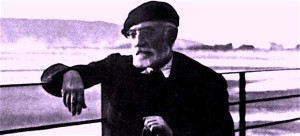 Found in Essays and soliloquies by Miguel de Unamuno (London: Harrap 1924) this preface written on the windswept Spanish island of Furteventura. The island is now mainly a holiday destination, although there is an impressive statue of Unamuno by the main road and also a life size statue of him on a side street. Unamuno was exiled to Fuerteventura in 1924 by the Spanish Government for his political ideas. His friend J.E. Crawford Flitch visited him there and prepared (and translated) this selection.
Found in Essays and soliloquies by Miguel de Unamuno (London: Harrap 1924) this preface written on the windswept Spanish island of Furteventura. The island is now mainly a holiday destination, although there is an impressive statue of Unamuno by the main road and also a life size statue of him on a side street. Unamuno was exiled to Fuerteventura in 1924 by the Spanish Government for his political ideas. His friend J.E. Crawford Flitch visited him there and prepared (and translated) this selection.
Author’s preface
I am writing these lines, today the 6th of June, 1924, in this island of Fuerteventura, an island that is propitious to calm thinking and to a laying bare of the soul, even as this parched land is bare, bare even to the bone. Here I have been confined now for nearly three months, no reason for my confined having been given other than the arbitrary mandate of the military power that is de-civilising and debasing my native country.
Hither came my friend Mr. J. E. Crawford Flitch to bear me company. He was entrusted by Mr. Alfred A. Knopf with the task of making an anthology or florilegium of my shorter articles and extracts from my more extensive writings which should present a conspectus of my whole literary work. It is he, my friend and translator, who is responsible for the selection of the pieces which form this anthology…
Among these essays is one upon the religion of Quixotism. Hitherto I have been meditating and perhaps dogmatising upon this religion – now I am living it. For it is here, where the waves murmur tidings of my native shores, the mountains coast of the wild Bay of Biscay, it is here that I have felt most deeply all the melancholy grandeur of the ridiculous passion of the Knight of the impossible Chimera. While the cowardly comic-opera tyrants who have banished me here are dishonouring our Spain, her whom they call their mother, I am exalting and enternalising her, and I call her my daughter.
There is a famous Spanish couplet which says that there is no handful of earth without a Spanish grave –
No any un pun ado de tierra
Sin una tumba española,
and it would seem that these unhappy rulers wish to extend the national graveyard. And I propose that there shall be no corner of heaven without a nest of Spanish thought.
Nests of Spanish thought are the pieces which compose this book.
And now I return to contemplate the sea, to feed my spirit upon it, to watch its white-crested waves which are born and die and succeed one another like the generations of men and of men’s works in the sea of history. I return to contemplate the all-consoling sea which smiles, with its superhuman smiles, upon our tragic human frailties.
Greeting! my readers of the English-speaking world. And when, having read this book, you wish me fare-well, may you carry with you something of the quixotesque passion which I have put into my work and which is the life of my life.
